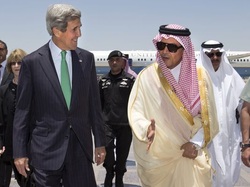 (Photo: By Jacquelyn Martin, AP) (Photo: By Jacquelyn Martin, AP) Original Article: USA TODAY Saudi Arabia and other Gulf monarchies, unhappy with a U.S. pivot from a leading role in the Middle East, are taking more active roles in the influencing of foreign affairs, such as arming al-Qaeda in Syria's civil war and bankrolling the Egyptian military takeover. "When you're not viewed as a reliable ally, and as a country no longer as dominant in the region, you lose influence on everything," says Elliott Abrams, a former adviser on the Middle East to former president George W. Bush. "You'll get less help on anything that doesn't involve their immediate interests."
Abrams says the Obama administration's reluctance to take a strong hand in the region's conflicts is fracturing longstanding relationships with allies and threatens to make it harder to control events in favor of U.S. national security. Aaron David Miller, a former senior Middle East adviser at the State Department, says U.S.-Saudi relations are certainly strained, though not to the point of a major break. The relationship is so important to both countries that it "is too big to fail," Miller said. "The problem is where do the Saudis go? There is no military relationship as valuable and prestigious and effective as what you can buy from the Americans." Frustration with U.S. policy in Bahrain, Egypt, Iran, Israel and Syria has already resulted in actions by the monarchies that have stymied U.S. influence: >The Saudis on Friday rejected a temporary seat on the United Nations Security Council, citing the council's failure to protect Syrian civilians and to resolve the Israeli-Palestinian conflict. >Saudi intelligence chief Prince Bandar bin Sultan has warned of a "major shift" in dealings with the USA over differences on Syria and U.S. overtures to Iran, according to Reuters, citing unnamed Saudi sources. USA TODAY could not verify the information. >Gulf states pledged $15 billion in aid to Egypt's new military-led government at a moment the USA sought to use its $1.5 billion in aid to sway Egypt to return to democracy. >Despite a recent agreement by the Saudis and United Arab Emirates to purchase $10.8 billion of advanced U.S. weapons, those countries are also seeking new military and economic relationships with other world powers, such as China, Brazil and in Europe. Gulf states have also made worrying weapons transfers to rebels in Syria, where the United States has sought to prevent advanced gear from reaching Jihadis fighting to overthrow dictator Bashar Assad, fearing they will later turn on U.S. allies in the region, said Rep. Mike Rogers, R-Mich., chairman of the House Intelligence Committee. Al-Qaeda affiliates are now debating whether to launch "external operations" – terror attacks – now or after securing more territory in Syria, Rogers said. "That's why Saudi Arabia turning away from us is a problem," he said. Secretary of State John Kerry said this week that "Saudi Arabia and the United States agree on a great deal" and continue to cooperate. "It's our obligation to work closely with them, as I am doing," Kerry said.
0 Comments
Your comment will be posted after it is approved.
Leave a Reply. |
Get News Updates!Categories
All
Archives
February 2021
|
 RSS Feed
RSS Feed
